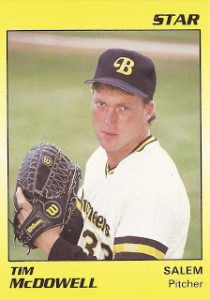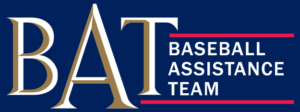“The Baseball Assistance Team (B.A.T.) was formed in 1986 by a group of former Major League Baseball players. B.A.T. was founded to confidentially help members of the Baseball Family who were in need of assistance with nowhere else to turn.”
I had the privilege of speaking with Erik Nilsen, Director, Baseball Assistance Team (B.A.T.) at Major League Baseball a couple years ago. Truly a fascinating conversation about the ins and outs of a program thats helps the baseball family in need of medical, financial or psychological assistance.
I recently spoke with B.A.T. Addiction and Recovery Consultant, Tim McDowell. McDowell has experienced much that the game can provide and now is using his skills as an educator, mentor, and facilitator to make a difference in the lives of others.
The GM’s Perspective: You’ve been a B.A.T. Addiction and Recovery Consultant since 2016. You actually took over for your father, Sam, who held that position since 1987.
How did you get into a position like this once your playing career was done?
Tim McDowell: I’ve always been fascinated by the psychology piece of it. My dad was an alcoholic. So I grew up with that, but what an amazing transformation once he went to treatment and got sober.
I went to college and played baseball and gravitated towards the psych field. I was a psychology major and got to work on a hotline and actually working with other people. That’s where I fell in love with it.
I’m in recovery myself. I got clean at a young age. When my dad got sober I was about a year behind him. While I was playing in the minor leagues with Pittsburgh, in one of the cities we were playing out of I volunteered in a rehab facility for teenagers during our homestands. One of my supervisors encouraged me to get my certification as an addiction counselor. I thought I had a pretty good gift at working with kids; I could relate to them.
When I was done playing I worked with my dad as an EAP for the Texas Rangers and Toronto Blue Jays. When he got sober a lot of teams heard about it. They would call and ask if he could help with one of our players. My dad would help them on the path to recovery.
When our contracts weren’t renewed, I ended up working in the treatment field in Pittsburgh, got my Masters, and became a licensed therapist. When my dad retired from B.A.T., I applied based on my background in baseball and my critical experience.

GMs: What does your role as Addiction and Recovery Consultant mean to those who may not be familiar with the term?
TM: The whole mission is a short term bridge. The philosophy is to find out what the problem is. What is holding the player back from being independent from needing help and to have that self-sufficiency? Whether it’s depression or anxiety, sometimes they’re just stuck after their baseball career and just don’t know where to go from there and don’t believe they can do anything else.
GMs: When you were playing did you see a lot of players who may have needed help but had nowhere to turn?
TM: Not really when I was in the minor leagues, but you saw the guys who drank hard and played hard. When I was an EAP some teams would say this pitcher is drinking a lot or we’re seeing a deterioration in his ability because of it. When talking to the player, he wouldn’t see it. He wouldn’t see that his drinking is affecting his performance. It was more bad luck and bad breaks in his opinion.
When they get out of the game, those issues become more apparent. Their drinking has escalated and the mental health issues are now more severe and at point where it can’t be controlled.
More and more we hear about anxiety and depression in athletes, but even after all these years mental health struggles are still seen as not macho. However, the more athletes do talk about it, it becomes more visible and more acceptable. When my dad played they certainly didn’t talk about this that’s for sure. The solution if a player had a problem was to simply trade him and let another team deal with it. They’ve come a long way, even having the EAP programs available to players where they offer assistance to current players, get them help in the offseason, and try to salvage their career.
GMs: In your role as EAP for the Texas Rangers, Toronto Blue Jays and Chicago Cubs, what scenarios did you encounter?
TM: All types that you can imagine. We really had to reinforce the confidentiality piece with the player. Marital issues, infidelity, and financial problems were discussed, however, confidence was a big deal. Some were having confidence problems, others were having difficulty staying calm under pressure. It really morphed into sports psychology.
In my experience, things have to be extremely bad in the players eyes for him to pick up the phone and ask for help. There’s so much ego and pride involved. Once they realize what’s available and they’re not the only one, the floodgates open up.
GMs: I want my capstone to mean something more than just an assignment. I want to really dig in to the research of leadership/sports leadership and the positive impact it has on people; specifically athletes (amateur, collegiate, professional {pre/post retirement}) that are dealing with mental health issues like anxiety/depression.
It has a strong correlation to a non-profit I created: IGNITE CHANGE (still in beta form) where my main activity will be running clinics focused on playing baseball the right way, but with a component on leadership, attitude, and behaviors.
Dealing with anxiety/depression for over 20 years, this was the first time that I finally opened up about it. Sports has always been the constant; that teamwork and belonging piece has always been a calming voice.
Have you seen anything similar where being on the field has actually helped players keep it under wraps?
TM: You’re exactly right. They grow up in the clubhouse with that team mentality. It’s a brotherhood. Baseball’s a bit of a fantasy world in a sense that you’re in sort of a separate reality when you’re playing and chasing that dream. When you’re on the field or in the locker room you’re not worried about bills and this and that. It’s a safe space for you. After the game is when all those things come out. Some become so good at baseball or other sports because they’re overcoming insecurities and focusing so much on one thing. It’s a helluva lot of incentive to perform well on the field, while off it they’re in pain.

GMs: You are working for an amazing organization and really go above and beyond the call of duty when it pertains to players who have been long forgotten by a game that meant so much.
What’s the best part of your job?
TM: I love seeing people overcome some pretty tough circumstances and heal and have hope. For every player we help, there’s a wife and kids behind the scenes who are hurt, scared, and desperate. When you get those phone calls where the player or family member is crying tears of joy and relief it truly is a blessing from my job. It’s about changing lives and changing outcomes.




